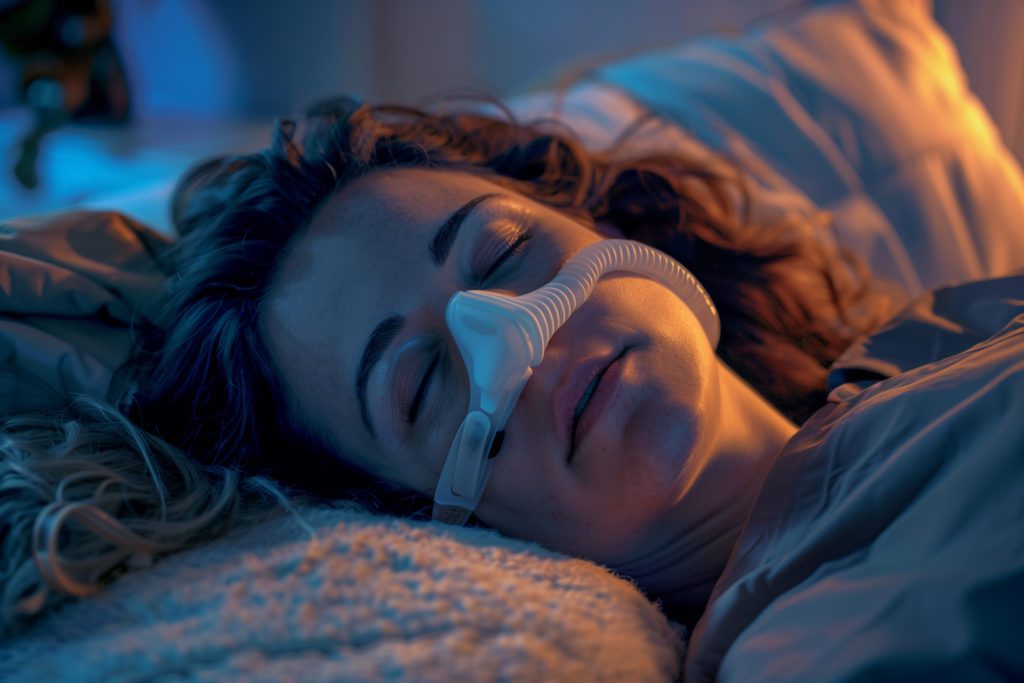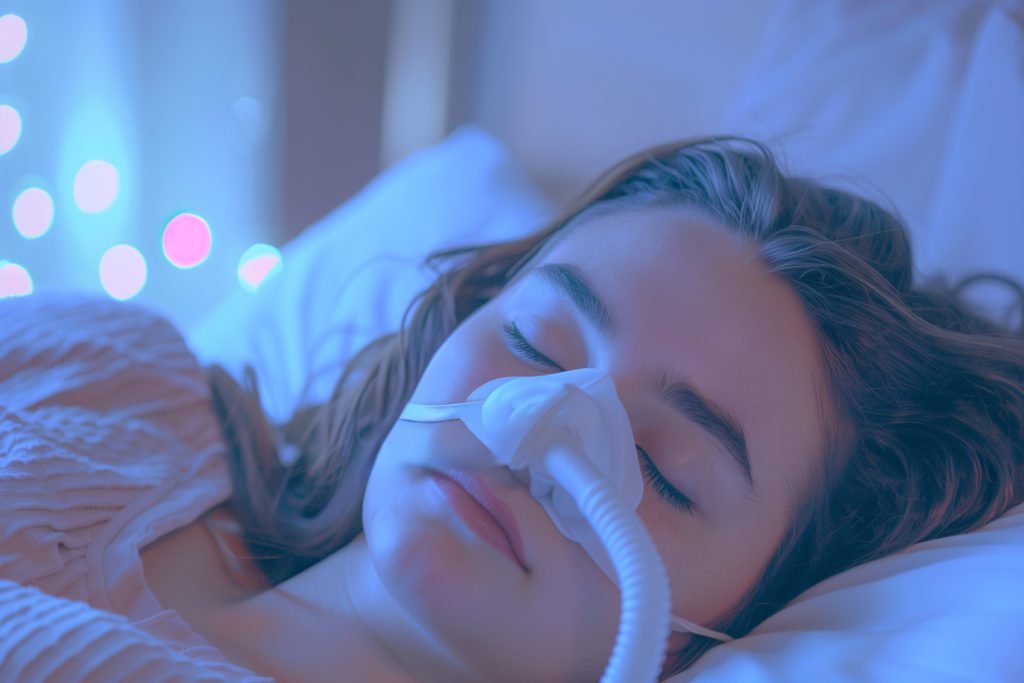
Psychological Effects of CPAP Therapy
Need to use a CPAP machine? Discover the psychological benefits of this therapy option and how you can overcome specific barriers to CPAP adherence.

CPAP therapy—continuous positive airway pressure (CPAP) therapy—is meant to help individuals who require further support while sleeping with issues like sleep apnea and more. While there are beneficial and noticeable physical effects, many people don’t know about the psychological impact of CPAP therapy—before, during, and after starting this treatment. Fortunately, we’ve done some research to discover what patients who engage in CPAP therapy can expect.
In this article, you’ll learn about the initial challenges people face when they begin to use this therapy and what happens with continued use. We’ll also discuss some of the hurdles associated with CPAP therapy, including anxiety and depression, and how you can cope with these conditions. Let’s first explore the initial issues you may have to overcome psychologically when you use CPAP therapy.
What to Expect When You First Start CPAP Therapy
If you’re first starting CPAP therapy, it can be daunting, but many studies have shown that you may be facing similar hurdles as compared to others. One of the most common barriers to adherence to the use of CPAP therapy is the fact that the machine can be irritating to the skin or that you may feel claustrophobic. For those with depression, you may face similar difficulties.
Patients who struggle with depression may be less likely to regularly engage in using their CPAP therapy, which can be an issue for their health and even for their depressive symptoms. Psychologically, you may feel like CPAP therapy is not for you and that it is not comfortable, or it may even be more of a chore to adapt to if you struggle with depression and its accompanying symptoms. However, even with these initial challenges, there are so many excellent benefits that can come from using CPAP therapy.
The Psychological Benefits of Using CPAP Therapy Consistently
As surprising as it may be, CPAP therapy is actually associated with numerous psychological benefits that can add further value to your life. Aside from the obvious physical benefits to your health as well as alleviating sleep challenges, CPAP therapy can help to alleviate depressive moods and anxiety, as well as sleepiness that you might feel due to issues like sleep apnea (Source: European Clinical Respiratory Journal).
Furthermore, aside from helping with limiting depression and anxiety, CPAP therapy can also help with your cognition. One of the downsides of sleepiness is impaired cognitive performance, but CPAP therapy can alleviate this and even encourage better mental performance. In some studies, it has even been shown to lower the risk of dementia because of the consistent airflow that helps the body stay healthy.
Evidently, CPAP therapy may be prescribed to help with sleep apnea and other health conditions, but it has a number of benefits that are important for your overall health. In order to experience these benefits, however, you must overcome the barriers that you face initially, which will be explored next.
How to Overcome CPAP Therapy Adherence Challenges
It’s true—CPAP therapy can be uncomfortable, irritate your skin, or even feel wrong at first, especially if it is your first time using this treatment. Even then, with the physical and psychological benefits that we have discussed, you can overcome these barriers to ensure you take advantage of this opportunity to improve your health, sleep, and more. Here are some recommendations for you to begin adhering to CPAP therapy with ease:
- Wear the Right Size Mask: Unfortunately, one of the common issues people face that makes CPAP therapy uncomfortable for them is the wrong size mask. Make sure you use a mask that correctly fits your face and is not too big or too snug. It should be comfortable and fully cover your face and nose.
- Practice Wearing It: If sleeping with it is a challenge, try wearing it during the day. This can undoubtedly help you become more comfortable and even encourage your body to adjust to this new and required CPAP therapy.
- Manage Machine Noise: Many people cannot sleep at night because ambient noise tends to wake them up, especially with older CPAP models. Make sure that your CPAP machine is not sitting next to you, and if you still struggle with the noise factor, try using white noise to help you get to bed with ease.
Mitigating Psychological Concerns While Using CPAP Therapy
Even though CPAP therapy tends to provide a number of psychological benefits, there may still be a chance that you struggle with conditions like depression and anxiety while using this treatment option for sleep apnea. One of the best ways to help mitigate the psychological challenges you might encounter is to seek support through mental health resources.
While it might not be the first thing you think of, seeking support—such as counseling or therapy—can help you uncover the reasons why you might be depressed or anxious. As it turns out, sleep apnea patients are among the most likely individuals to have these concerns, among other health conditions that impact their health (Source: PubMed).
If you find yourself struggling, even despite the benefits that we have explored, don’t be afraid to reach out and ask for help. Additionally, you can also engage in self-care more regularly to help you overcome anxiety or depressive symptoms.
Enjoy Better Sleep and Mental Health with CPAP Therapy
Beginning any transition to a new treatment or therapy option can be difficult, especially for those who must use CPAP machines. Even with the initial issues you might face, there are many benefits that can aid your mental health and improve your life. If you find yourself struggling with adhering to using your CPAP regularly or even encounter mental health problems, don’t be afraid to ask for help and ease your way into your new routine.
For more information about how to encourage better sleep health, visit our website and read articles that will help you create an ideal sleep routine.
FAQ
What if I rip my CPAP mask off in my sleep without realizing it?
This happens to a lot of people in the beginning! Your brain isn’t used to it yet, so you might remove it unconsciously. Try adjusting the fit, using a mask with a softer feel, or wearing it for short periods before bed to help your body adjust. Some machines also have alerts that can let you know if your mask comes off during the night.
When will I start feeling better?
Some people notice a difference within days, while others take weeks or months to feel real improvements. Just like any habit, the more consistent you are, the better the results. Keep going—it’s worth it!
I have anxiety—how can I make CPAP less stressful?
Start by taking small steps. Wear the mask while watching TV or relaxing so your brain associates it with comfort. If the airflow feels overwhelming, practice breathing with it while awake to get used to the sensation. Meditation or deep breathing exercises before bed can also help.
Why do I feel more emotional now that I’m using CPAP?
When you finally start getting the deep sleep your body has been craving, your brain can process emotions better. Some people feel more energetic, while others notice an emotional “release” as their body adjusts. It’s a good sign that your sleep-deprived brain is healing!
What if I feel like giving up on my CPAP?
You’re not alone! Many people struggle in the beginning. But remember—better sleep means better energy, mood, and overall health. If it’s uncomfortable, tweak the fit, try a different mask, or ask for support. Small adjustments can make a big difference!

Written by
Marie Soukup
Marie Soukup is a seasoned copywriter, editor, and Integrative Nutrition Health Coach with a certificate from the Institute of Integrative Nutrition (IIN). With years of experience working with brands across diverse industries, Marie is passionate about holistic health and crafting compelling content.
Download Pillow
Get help
Press & News
Legal
Connect
X (Twitter)
Company
Copyright © Neybox Digital Ltd.



